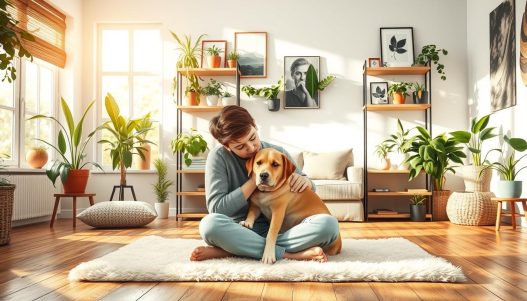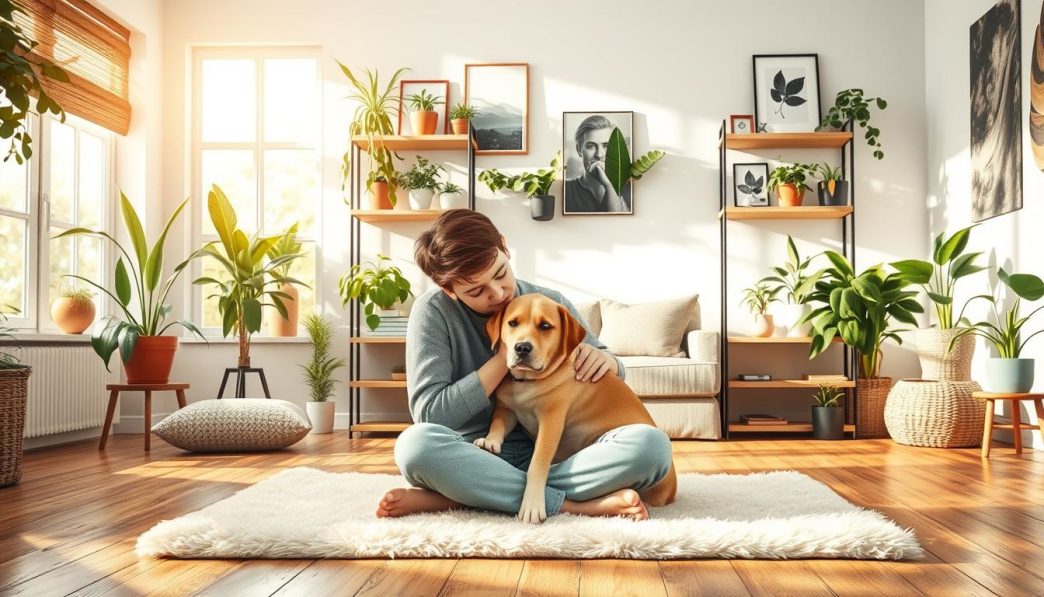Owning a pet can be very rewarding. It brings many mental health benefits and boosts overall well-being. A 2019 survey found that 67% of US households have a pet. This shows how important pets are in our lives.
The bond between a pet and their owner is strong. It’s based on trust, companionship, and love. This bond leads to many physical and emotional benefits. Owning a pet can lower stress, improve mood, and help people connect more with others.
Key Takeaways
- Pet ownership is linked to better mental health and well-being.
- The bond with pets can reduce stress and improve mood.
- Having a pet can also increase social connections and life quality.
- Pets offer companionship and affection, making us feel like we belong.
- Pet ownership can also lower blood pressure and improve heart health.
The Human-Animal Bond: A Foundation for Healing
The bond between humans and pets is deep and complex. It has been studied for years, showing its healing power.
The Evolution of Human-Animal Relationships
Humans and animals have grown closer over time. What started as a need for survival turned into a bond of companionship and emotional support. The domestication of animals was the first step in this journey, leading to the wide variety of pets we have today.
How Bonds Form Between Humans and Pets
Creating a strong bond with pets involves many things. These include interaction, care, and affection. Oxytocin, known as the “love hormone,” is key in forming this bond.
The Role of Oxytocin in Bonding
Oxytocin is released when humans and animals have positive moments together, like petting or playing. This hormone strengthens the emotional bond between them, creating feelings of attachment and love. Studies have found that oxytocin levels go up in both humans and animals during these moments. This shows how important oxytocin is in building and keeping the human-animal bond.
The Therapeutic Benefits of Pet Ownership
Pets can greatly improve our lives. They help with both physical and mental health. The benefits of having a pet are many, from better physical health to improved mental and emotional well-being.
Physical Health Improvements
Research shows that pet owners often have lower blood pressure and less stress. Owning a pet can also lead to more exercise, especially for dog owners who need to walk their pets regularly.
Mental and Emotional Wellness
Pets offer a lot of mental health benefits. They provide companionship, which can help fight loneliness and isolation. They also offer emotional support, which is key in managing conditions like depression and anxiety.
Social Connection Enhancement
Pets can also help us make friends. Whether it’s at dog parks, pet stores, or community events, pets help us meet new people. This is especially good for those who find it hard to socialize or meet new people.
Building Community Through Pets
More and more, pets are helping build communities. Communities are hosting pet-friendly events, making pet owners feel like they belong. Pet owners can join local groups or help out at animal shelters, which helps them meet others.
In summary, the benefits of having a pet are huge. They improve our physical health, support our mental and emotional health, and help us make friends. Pets are truly important for our overall well-being.
Stress Reduction: How Pets Help You Unwind
Pets are a big part of our lives, and they help us relax and reduce stress. Being around animals can make us feel calmer and more relaxed. This is good for our mental health.
The Science Behind Lowered Cortisol Levels
Studies show that pets can lower cortisol, the stress hormone. Lower cortisol levels mean less stress and anxiety. This is good for our overall health.
Petting a dog or cat can also lower cortisol levels. This shows how animals can calm us down.
The Calming Effect of Petting and Touch
Petting or touching a pet can calm us down. This touch releases oxytocin, known as the “love hormone.” It makes us feel relaxed and connected.
A study found that petting a dog increases oxytocin levels. This leads to calmness and well-being. The calming effect is immediate and can be a powerful tool in managing stress.
Mindfulness Through Pet Interaction
Being with pets makes us more mindful. It helps us focus on the present moment. This reduces worries about the past or future.
“the present moment is the only moment available to us, and mindfulness through pet interaction can be a potent stress-reduction strategy.”
Doing activities with pets, like walking or playing, also boosts mindfulness. This helps lower stress levels.
Adding pets to our daily lives can improve our mental health and well-being. The bond between humans and animals is key to a healthy lifestyle.
Pets as Natural Mood Boosters
Pets have a special way to make us feel better and improve our mood. They offer companionship and affection, which can fight off sadness and loneliness.
Combating Loneliness with Furry Friends
Pets can fight loneliness by being our friends. For those living alone, a pet is always there to offer love and reduce feelings of being alone. Studies show that pet owners feel less lonely and are more likely to meet new people.
How Pets Help Manage Depression Symptoms
Pets can offer emotional support, especially for those with depression. Caring for a pet gives a sense of purpose. The love they give can also lift our mood. Research shows that having a pet can reduce depression symptoms and improve mental health.
Anxiety Reduction Through Pet Companionship
Being around pets can lower anxiety. Their calm presence and the act of petting them can reduce stress hormones and help us relax. This is great for anyone feeling anxious or stressed.
In short, pets are key to better mental health. They help fight loneliness, manage depression, and reduce anxiety. Their presence can greatly improve our mood and quality of life.
Heart Health and Beyond: Physical Benefits
Pets bring joy and health benefits to our lives. They help us stay active and improve our heart health. This makes them great companions.
Cardiovascular Improvements in Pet Owners
Pet owners often have lower blood pressure and cholesterol. They also tend to have a healthier body mass index. These factors lower the risk of heart disease.
Pets also help reduce stress. Stress is a big risk for heart problems. So, pets are good for our hearts.
Getting Active with Your Pet
Walking or running with pets boosts heart health and fitness. It’s a fun way to stay active. It also strengthens the bond between pet and owner.
Strengthened Immune System Response
Being around pets, especially as kids, boosts the immune system. Kids with pets may have fewer allergies and asthma. Pets encourage a healthy lifestyle, like better hygiene.
Pets offer many health benefits, from heart health to a more active life. They play a big role in our well-being. As we learn more about the human-animal bond, it’s clear pets are essential for our health.
Professional Pet Therapy Applications
Exploring the benefits of owning a pet leads us to professional pet therapy. This involves trained animals and their handlers visiting places like hospitals and nursing homes. They provide comfort and emotional support.
Structured Animal-Assisted Therapy Programs
Structured animal-assisted therapy programs aim to achieve specific goals. They are led by trained therapists who use animals in their plans. Animals help reduce stress, improve mood, and boost social interaction.
Benefits of Structured Programs:
- Improved patient outcomes
- Enhanced emotional well-being
- Increased social interaction
Understanding Service, Therapy, and Emotional Support Animals
It’s important to know the difference between service animals, therapy animals, and emotional support animals. Service animals are trained for specific tasks for people with disabilities. Therapy animals provide affection and comfort. Emotional support animals offer companionship and emotional support.
| Type of Animal | Training | Purpose |
|---|---|---|
| Service Animal | Task-specific training | Assist individuals with disabilities |
| Therapy Animal | Socialization and obedience training | Provide comfort and affection |
| Emotional Support Animal | No specific training required | Offer companionship and emotional support |
Real-Life Success Stories in Clinical Settings
Pet therapy has been a success in many clinical settings, like hospitals and rehabilitation centers.
Pets in Hospitals and Rehabilitation Centers
In hospitals and rehabilitation centers, pets help in patient recovery. Studies show that pet therapy can reduce stress and anxiety. It also improves overall well-being.
Understanding pet therapy helps us see the important role animals play in healing and therapy.
Growing Up with Pets: Benefits for Children
Children who grow up with pets form a special bond. This bond helps them develop emotional intelligence and learn responsibility. It teaches them important life skills and gives them a friend.
Emotional Intelligence and Empathy Development
Having pets can really boost a child’s emotional intelligence. They learn to handle their feelings better by talking to pets. They also grow more empathetic by understanding their pets’ needs.
- Recognizing and responding to pet’s emotions
- Developing compassion through pet care
- Understanding the importance of empathy in human-animal relationships
Learning Responsibility Through Pet Care
Looking after a pet teaches kids about responsibility. Tasks like feeding and grooming teach them about duty and accountability. These activities show them the value of commitment and the effects of their actions.
How Pets Help Children with Special Needs
Pets are great for kids with special needs, offering friendship and emotional support. For kids with autism, pets are a key part of their therapy.
Pets in Autism Therapy
Pets are now used in autism therapy to help kids with Autism Spectrum Disorder (ASD). The bond between a child with autism and their pet is very helpful. It can lower anxiety and improve how they interact with others.
“The use of animals in therapy has been shown to have a positive impact on children with autism, enhancing their social skills and reducing stress.”
In summary, having pets is very good for kids. It helps them grow emotionally, learn responsibility, and get therapy. The bond between kids and pets is very powerful for their well-being and growth.
Golden Years with Furry Friends: Seniors and Pets
As people get older, having a pet can change their lives. Pets offer companionship and a sense of purpose. They help seniors feel emotionally supported and comforted.
Fighting Isolation and Loneliness
Many seniors feel isolation and loneliness after retirement or losing a spouse. Pets can ease these feelings by being companions. They give seniors a reason to meet new people and join in community events.
Cognitive Benefits and Dementia Prevention
Studies show that owning a pet can improve seniors’ memory and lower dementia risk. The mental challenge and stress relief from caring for pets are key.
Staying Active and Engaged
Pets need care, which keeps seniors active and engaged. Activities like walking a dog or playing with a cat boost physical and mental health.
In summary, pets greatly improve seniors’ lives. They help fight isolation, loneliness, and cognitive decline. Pets bring joy, comfort, and a sense of purpose to older adults.
Matching Pet Types to Your Therapeutic Needs
Pet ownership offers different benefits based on the pet type. Research shows that various pets provide unique benefits. It’s key to pick a pet that meets your needs.

Dogs: Active Companions for Exercise and Security
Dogs are known for their loyalty and companionship. They encourage physical activity like walking or playing fetch. This improves health and fitness.
They also offer security and comfort. This can help with anxiety and depression.
Cats: Independent Friends for Calm and Comfort
Cats are great for those who like low-maintenance pets. Petting a cat can be calming, reducing stress. They provide companionship without being too demanding.
Small Animals: Low-Maintenance Therapeutic Options
Small animals like rabbits or hamsters are easy to care for. They offer emotional support and comfort. Their care is simple, making them perfect for beginners.
Aquatic Pets: The Meditative Benefits of Fish
Aquatic pets, such as fish, are calming. Watching them swim can be meditative, reducing stress. Their gentle movement is soothing, making them ideal for those seeking calm.
A study shows the human-animal bond is powerful for healing. Choosing the right pet can greatly improve your life.
Navigating the Challenges of Pet Ownership
Pet ownership is a big responsibility. It brings joy but also financial, time, and lifestyle commitments.
Budgeting for Your Pet’s Needs
One big challenge is budgeting for your pet. This includes food, vet care, and supplies. A budget helps ensure your pet gets the care they need without breaking the bank.
- Plan for regular vet visits
- Consider pet insurance
- Remember to budget for supplies like food, toys, and bedding
Creating Time in Your Schedule
Pets need attention and care, which takes time. It’s key to make time for their needs, like exercise, training, and play.
Tips for managing your time effectively:
- Set a routine for pet care
- Think about hiring a pet sitter or asking a friend for help
- Make time for fun activities with your pet
Finding the Perfect Pet Match for Your Lifestyle
Choosing the right pet is key for a happy relationship. Think about your living situation, work schedule, and how much time you can give to your pet.
Working with Adoption Counselors
Adoption counselors can help find the perfect pet for you. They know about your lifestyle and needs. They offer insights into a pet’s personality and what they need.
Working with an adoption counselor helps you find a pet that fits your life perfectly.
Innovative Approaches in Pet Therapy
New ideas in pet therapy are coming up, showing us new ways animals help us. With technology getting better and our understanding of animal bonds growing, we’re seeing new ways to use pets in therapy.
Digital and Virtual Pet Therapy Options
Digital pet therapy is getting more popular. It uses virtual pets and apps to offer comfort and companionship. These digital friends are great for people who can’t have a real pet because of allergies or mobility issues.
Robotic Companions: Benefits and Limitations
Robotic pets, like robotic dogs and cats, are being looked at for their therapy benefits. and social interaction without the need for actual pet care. But, they can be expensive and sometimes have technical problems.
New Research Frontiers in Human-Animal Healing
Research is finding new ways animals help us heal. Studies are looking at how pets affect our bodies and minds. This research is helping make pet therapy more effective and targeted.
Conclusion: Embracing the Healing Power of Animal Companions
The bond between humans and animals has been key in healing and companionship for centuries. We’ve seen how pets help us in many ways. They reduce stress, improve our mental health, and even help our physical health and social connections.
By welcoming pets into our lives, we can see a big positive change. Whether it’s a dog, a cat, or even fish, they offer special support and comfort. They make our lives better in many ways.
It’s clear that pets are good for everyone, no matter their age. From kids to seniors, pets bring joy and health. By having a pet, you’re not just getting a friend. You’re also improving your health and wellbeing.







